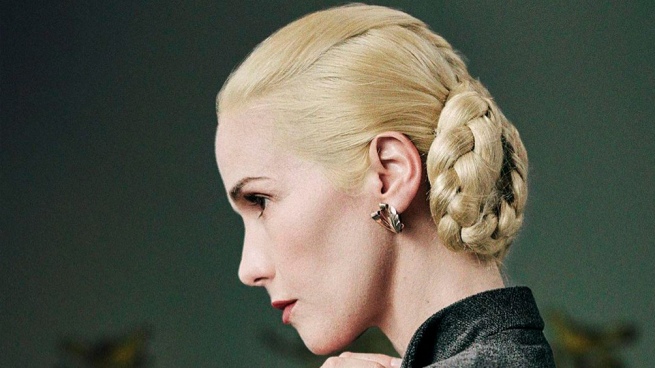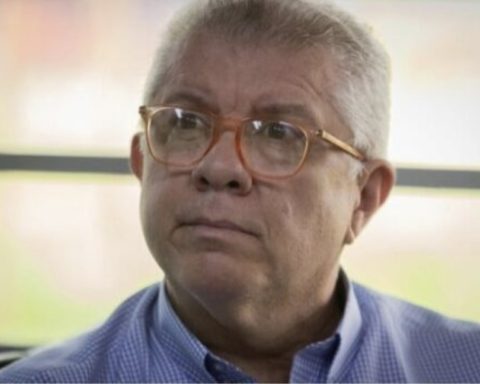Natalia Oreiro takes on the challenging task of playing Eva Duarte, whom she characterizes as “the definitive female character in Argentine and Latin American history.” she will be in “Santa Evita”, the next miniseries that adapts the best seller by journalist Tomás Eloy Martínez with a contemporary twist and that can be seen on the Star + platform from this Tuesday, on the 70th anniversary of the death of the remembered actress and Peronist leader.
“Many years had to pass before I was encouraged to interpret it. It is the dream figure that any actress would want to do, but in my personal case I was not encouraged, because I felt that I did not have the tools as an actress or perhaps as a woman to do it, “he admitted. Oreiro in dialogue with Télam ahead of the launch of the strip, directed by Rodrigo García and Alejandro Maci and scripted as a duo by Marcela Guerty and Pamela Rementería.
Almost three decades of experience in the entertainment industry passed, which even led her to stardom in distant latitudes such as Russia, so that the native of Montevideo was faced with the opportunity -although not for the first time- to put herself in the shoes who transcended as an emblem of the fight for social justice from the platform that, when politics was still the exclusive domain of men, offered her marriage to former president Juan Domingo Perón.
Undoubtedly, it was that profound role in the work of the Peronist administration back in the 1940s that became his legacy, inevitably exalted by his Early death at age 33 due to cervical cancer.
“Many years had to pass before I was encouraged to interpret her. She is the dream figure that any actress would want to do, but in my personal case I was not encouraged, because I felt that I did not have the tools as an actress or perhaps as a woman to do it”Natalia Oreiro
But its centrality in this story published in 1995 by Martínez, a prominent figure in publications such as Primera Plana and La Opinion, is part of another episode of his biography, a darker one, which invites an almost mysterious reading and lends itself easily to to a transfer to audiovisual format.
With a look that tends to the gender perspective in an era marked by feminism, the adaptation of “Santa Evita” reconstructs the arrival of the protagonist to her unforgettable position as a leader, drawing a parallel with the embalming of her body by the Spanish doctor Pedro Ara (Francesc Orella) and his subsequent kidnapping at the hands of the de facto government that overthrew Peronism in 1955.
So, the search for Peron (Dario Grandinetti) to immortalize his wife through this controversial medical procedure became, for 16 years, a sad future for the remains of Evita.
It was, after all, the clear evidence of the fear of a dictatorial regime that tried to undermine the flag that his name still raised, for which he delegated the incredible mission of his kidnapping to the colonel Carlos Moori Koenig (Ernesto Alterio).
Obsession, love, hate and fear run through this entire production that is known to be largely imagined and that, although it can be seen as an engaging thriller, it does not try to avoid either the portrait of a time suffocated by an ideological confrontation that still has repercussions in Argentina today or the misogyny that Evita experienced in life and, with an unusual perversity, also in his death.

In a conversation with this agency, Oreiro, who takes on the role with the powerful impetus of Evita and with remarkable voice work and physical staging, spoke about her approach to this character and the proposal for the series.
– The possibility of interpreting such a figure was a temptation that you didn’t have to consider too much, was it?
– There was a casting, so I had to convince them, it wasn’t the other way around. When they called me I thought it was a good time to see if there was something in my energy or my composition that could move the directors, that they see Eva in me, and it seems that yes, something happened, but when I stayed I got scared .
– Because?
– Because she is the definitive female character in Argentine and Latin American history, someone who is in the hearts of millions of Argentine men and women, and I had to put a lot of body into her. Incarnating someone who existed is something complex, and one wants to do it with great respect and a lot of truth. I made the decision not to imitate her, I did a performance, and I had the help of many people, from the Evita Museum, which opened and gave me a lot of unknown material, and of course the whole team. It was a job of many months of searching and sometimes of frustration, of thinking that I was not going to be able to do it.

– How was the process? Did you have to move away from your own notions about Evita to choose the traits you wanted to highlight about her?
– It was very difficult for me, because the more I knew about her, the more passionate I was about her figure. But I had to keep in mind that this is a series based on a novel, it is not Eva’s life, but a fiction that does tell of her most important moments, from her youth as an actress, her few years in Argentine politics and her outstanding work, his illness and his death, but all of this is crossed by what happens to his corpse, and it is told from fiction. Martínez said that much of what he wrote, invented or reconstructed, people took as true, and what was true was believed to be a lie. And that is also a bit what happened to her figure, the truth and the myth, and that is what the public is also going to ask, what happened to Eva’s real corpse. So yes, I had to leave my own point of view, although it always slipped a little, to give way to the directors’ point of view, from where they decided to tell this in the service of fiction.
– The writers had in mind to translate this work from a contemporary perspective, of gender. How do you think that translates into production?
– I think it is very current, this manipulation of a woman’s body was always terrible, at any time, but from today’s perspective it is tremendous what is generated by a woman with a voice, free, with vitality, with power, who still dead they are still afraid of him. Everything that happened moves me, and they were very difficult moments to act, because before being an actress I am a woman, and I was going through all that harassment. The men manipulating her decision, and even that of her own partner, who, wanting to do what she wanted, so that her people don’t forget her, ends up doing something tremendous. It is seen how politics and men take over her even when she is dead, something that continues to happen today, because they continue to take over her ideas or distort her story depending on who is telling it.
– In what ways do you think the series invites you to reflect on the past and the present?
– We have to take into account that she not only promoted the female vote, but also gave importance to women in political life, and that in the homes was very mobilizing. Many women did not agree, and for a 30-year-old girl who was not a politician, who did not have those studies, who was an actress, it was something really very strong. We have her entity thanks to her, in some way. From my place, I review that part of the story and I think that at the age of 30 I didn’t dare to play her in a movie, and she did those things when women had neither voice nor vote. I saw her footage, not just her speeches, how she went alone on the “Rainbow Tour”, and her conviction is impressive. She was born for it.


















